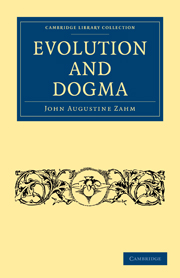Book contents
- Frontmatter
- PREFATORY NOTE
- Contents
- INTRODUCTION
- PART I EVOLUTION, PAST AND PRESENT
- PART II EVOLUTION AND DOGMA
- CHAPTER I MISCONCEPTIONS OF THEORY, ERRORS IN DOCTRINE AND MISTAKES IN TERMINOLOGY
- CHAPTER II MONISM AND EVOLUTION
- CHAPTER III AGNOSTICISM AND EVOLUTION
- CHAPTER IV THEISM AND EVOLUTION
- CHAPTER V THE ORIGIN AND NATURE OF LIFE
- CHAPTER VI THE SIMIAN ORIGIN OF MAN
- CHAPTER VII TELEOLOGY, OLD AND NEW
- CHAPTER VIII RETROSPECT, REFLECTIONS AND CONCLUSION
- AUTHORS AND WORKS CITED IN “EVOLUTION AND DOGMA.”
- GENERAL INDEX
CHAPTER VII - TELEOLOGY, OLD AND NEW
Published online by Cambridge University Press: 29 August 2010
- Frontmatter
- PREFATORY NOTE
- Contents
- INTRODUCTION
- PART I EVOLUTION, PAST AND PRESENT
- PART II EVOLUTION AND DOGMA
- CHAPTER I MISCONCEPTIONS OF THEORY, ERRORS IN DOCTRINE AND MISTAKES IN TERMINOLOGY
- CHAPTER II MONISM AND EVOLUTION
- CHAPTER III AGNOSTICISM AND EVOLUTION
- CHAPTER IV THEISM AND EVOLUTION
- CHAPTER V THE ORIGIN AND NATURE OF LIFE
- CHAPTER VI THE SIMIAN ORIGIN OF MAN
- CHAPTER VII TELEOLOGY, OLD AND NEW
- CHAPTER VIII RETROSPECT, REFLECTIONS AND CONCLUSION
- AUTHORS AND WORKS CITED IN “EVOLUTION AND DOGMA.”
- GENERAL INDEX
Summary
The Doctrine of Final Causes
FROM what precedes it is evident, that the most that Evolution can do is to substitute derivative for special creation, a substitution which, as we have learned, can be admitted without any derogation whatever to either faith or Dogma. But there is yet another objection against Evolution, which, by some minds, is regarded as more serious than any of the difficulties, heretofore considered, of either philosophy or theology. This objection, briefly stated, is that Evolution destroys entirely the argument from design in nature, and abolishes teleology, or the doctrine of final causes. In the case of Darwin, for instance, as we learn from his “Life and Letters,” he had no difficulty in accepting derivative in lieu of special creation, but when it came to reconciling natural selection and Evolution with teleology, as taught by Paley, he felt that his chief argument for believing in God had been wrested from him entirely.
So persuaded, indeed, have many naturalists and philosophers been, if we are to believe their own words, that Darwinism and Evolution have given the deathblow to teleology, that they forthwith dismiss all arguments based on design and final causes as utterly worthless. And, of those who are not in sympathy with Christianity, we find not a few who are unable to conceal their exultation over what they regard as the inglorious and complete discomfiture of the theologians.
- Type
- Chapter
- Information
- Evolution and Dogma , pp. 369 - 377Publisher: Cambridge University PressPrint publication year: 2009First published in: 1896



